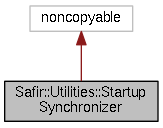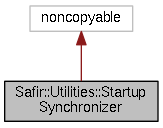|
Safir SDK Core
|
|
Safir SDK Core
|
This class can be used to synchronize creation and opening of a resource that is shared between multiple processes and threads. More...
#include <Safir/Utilities/StartupSynchronizer.h>


Public Member Functions | |
| StartupSynchronizer (const char *uniqueName) | |
| Construct a StartupSynchronizer for a resource with a given name. More... | |
| ~StartupSynchronizer () | |
| Destructor. More... | |
| void | Start (Synchronized *const synchronized) |
| Call this to start the synchronized startup. More... | |
This class can be used to synchronize creation and opening of a resource that is shared between multiple processes and threads.
The resource has to have a unique name, and the basic idea is that: One and only one call to Start will generate a Create() callback. All instances (including the Creator) will get a Use() callback when the create has completed. The last instance of StartupSynchronizer to be destroyed will generate a Destroy callback.
Note that multiple threads within a process may call these functions simultaneously on different instances with different arguments to no ill effect.
|
explicit |
Construct a StartupSynchronizer for a resource with a given name.
| Safir::Utilities::StartupSynchronizer::~StartupSynchronizer | ( | ) |
Destructor.
Stop using the shared resource. If this instance is the last user of the resource the Destroy callback will probably be called (see Synchronized class documentation).
| void Safir::Utilities::StartupSynchronizer::Start | ( | Synchronized *const | synchronized | ) |
Call this to start the synchronized startup.
The callbacks to synchronized will be called as described in the Synchronized class documentation.
Only one call to Start is allowed for a particular instance. Multiple calls result in undefined behaviour.
Multiple calls to different instances of this class with the same pointer argument also results in undefined behaviour.